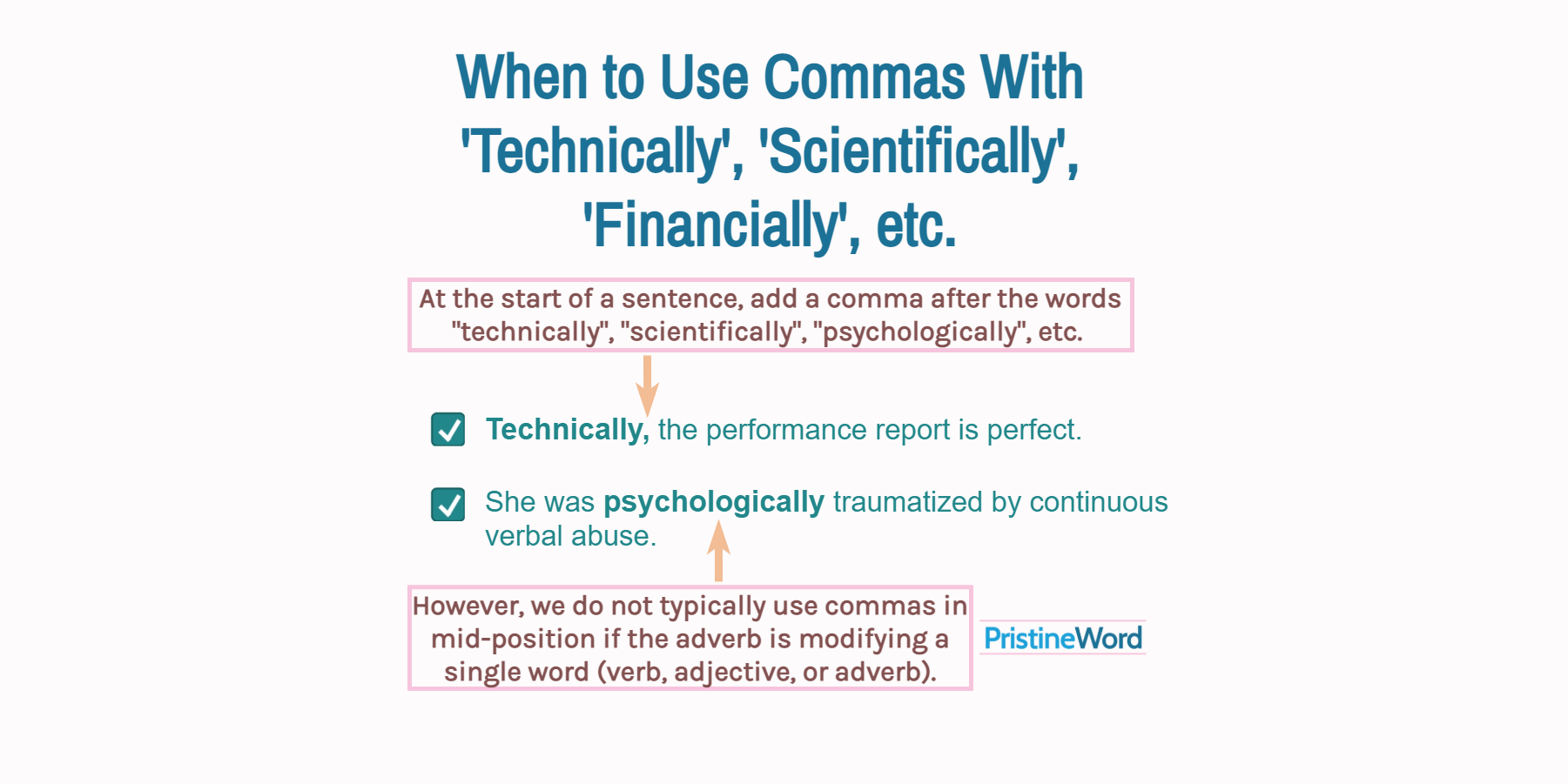At the beginning of a sentence, add a comma after the words "technically", "scientifically", "psychologically", "medically", "economically", "financially", etc. to place your statement in a particular context.
At the beginning of a sentence, add a comma after the words "technically", "scientifically", "psychologically", "medically", "economically", "financially", etc. to place your statement in a particular context.
Technically, the performance report is impeccable.
Technically the performance report is impeccable.
Add also a comma if the adverb is followed by the word "speaking".
Financially speaking, the company is going through difficult times.
In the middle of a sentence, place these words between commas to modify a complete sentence or clause.
Her project, technically speaking, is specific, measurable, and achievable.
But commas are generally unnecessary in mid-position if the adverb is describing a single word (verb, adjective, or adverb).
She was psychologically traumatized by continuous verbal abuse.
Contents
1. When to Use Commas Before or After 'Technically', "Scientifically", etc.
We use the following adverbs to indicate that a description or thought is related to a particular skill, technique, or area of expertise.
- technically
- scientifically
- psychologically
- financially
- medically
- politically
- etc.
Financially, her analysis makes sense.
When starting a sentence or clause with these adverbs, add a comma after them.
Medically, the results of the study are not robust.
Medically the results of the study are not robust.
The comma after "technically", "medically", etc. indicates that the adverb describes a whole sentence and not a single word.
Economically, the investment proposal is acceptable.
They are sometimes followed by the word "speaking". In such a situation, add a comma after the introductory phrase "technically speaking", "scientifically speaking", etc.
Scientifically speaking, your argument is correct.
The sentence adverb "technically" can mean "with regard to technology" or "strictly speaking". Follow the same comma strategy in both situations.
Technically, a great design usually leads to product success.
Technically speaking, you are wrong to say the protocol is not being followed.
You can combine two or more of these adverbs to set the context of the sentence.
Technically and financially, your project is viable as well as sustainable.
You can also use them in the middle of a sentence.
There is nothing wrong, psychologically speaking, with this behavior.
Place a comma before and after a sentence adverb (or adverbial phrase) in mid-position.
I would say, technically speaking, that the performance is correct.
I would say technically speaking that the performance is correct.
But make sure that the adverb modifies (describes) the whole sentence and not just a single word; that is, do not routinely use commas in mid-sentence (see next section).
Your investment proposal is economically viable.
In the example above, "economically" modifies a single word ("viable"), so no comma.
When connecting two or more independent clauses, place the adverb at the beginning or in the middle of the clause it modifies.
The project doesn't address social issues, but, economically, it is achievable.
2. When to Avoid Commas
Commas are generally unnecessary when using "technically", "scientifically", "psychologically", "medically", "financially", etc. to modify a single word (instead of a complete sentence).
They have been tortured psychologically.
In the example above, the adverb ("psychologically") modifies a single word ("tortured"), so no comma is required.
There are exceptions to the convention of not using commas with regular adverbs in mid-sentence. For example, you can insert commas in mid-sentence to interrupt the sentence flow, introduce an aside, or add emphasis.
Only 10% of companies in this sector are, technically and financially, independent.
Add commas when using these words at the start of a sentence.
Medically, the protocol is designed to improve the symptoms.
But again, when modifying a single word in mid-sentence, commas are unnecessary—and sometimes incorrect.
A medically induced coma is used to achieve a deep state of brain inactivity.
A medically, induced coma is used to achieve a deep state of brain inactivity.
3. List of Similar Words Where the Same Rules Apply
Follow the same comma rules when using these sentence adverbs:
- alphabetically
- culturally
- ecumenically
- historically
- humanistically
- linguistically
- parenthetically
- philosophically
- religiously
- sociologically
- therapeutically
- etc.
For example:
Alphabetically, B comes before G.
That work has been dominated by humanistically oriented scholars.
Sociologically, not philosophically, I agree with you.
The ritual has been carried out religiously.

